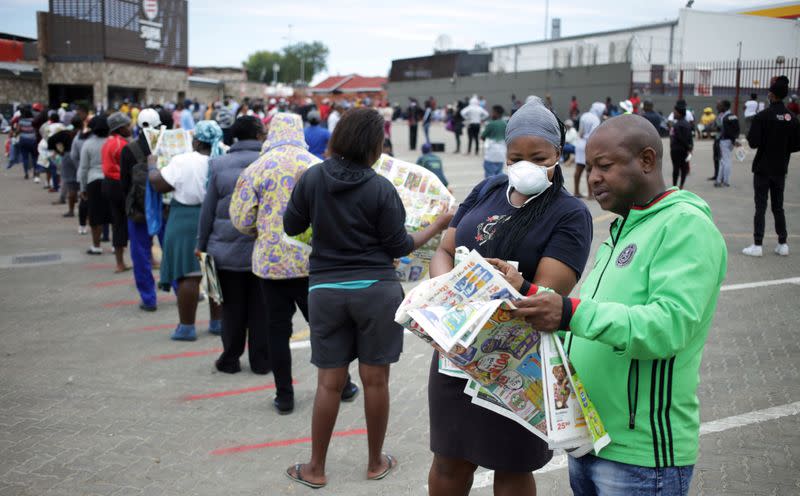South African economy plunged 51% in second quarter during strict lockdown
By Mfuneko Toyana
PRETORIA (Reuters) - South Africa's economic output shrank 51.0% in the second quarter, its fourth quarterly contraction in a row and largest on record, as a strict lockdown to curb the spread of the coronavirus shut down most activity, data showed on Tuesday.
Africa's most industrialised nation has been hit hard by the COVID-19 pandemic, recording the seventh-largest number of cases worldwide, although it has seen fewer deaths than some other badly affected countries.
Analysts polled by Reuters had predicted a 47.3% contraction because of the lockdown restrictions, which were among the harshest in the world.
"This is the first time in history that the South African economy has contracted for four straight quarters," Statistician-General Risenga Maluleke told a news conference.
The rand fell roughly 1% against the dollar on the dismal data to trade at 16.9325 per dollar.
Joe de Beer, another top official at Statistics South Africa, said that after adjusting for inflation the economy was roughly the same size in the April-June quarter as in the first quarter of 2007.
Most sectors declined steeply except for agriculture, which grew 15.1% in the second quarter from January-March, helped by fruit and nut exports, and better-than-average winter rainfall.
Mining declined 73.1%, manufacturing 74.9% and construction 76.6%. Gross domestic product (GDP) for the whole economy shrank 17.1% from the same period in 2019.
TOUGH TIMES
Jeff Schultz, economist at BNP Paribas, said the global impact of the pandemic coupled with the recent return of power cuts by ailing state utility Eskom would hamper any economic recovery.
"It will take a very long time to get to pre-pandemic levels," he said.
The government expects a GDP decline of at least 7% in 2020, a worrying prediction in a country where unemployment was at around 30% before COVID-19.
Pamela Mutandwa, 37, who runs a roadside vegetable stand in Pretoria, said times were hard. "It was really difficult during lockdown. There were no people buying and I struggled. When I opened in 2009 there were more customers."
Tlouama Abrama, 31, a petrol attendant, said he was disappointed by the government's economic policies. "They should be doing more to revive the factories around here so people can get jobs. Their policies are not working."
The finance ministry did not immediately respond to a request for comment.
(Reporting by Mfuneko Toyana; Writing by Alexander Winning; Editing by Catherine Evans and Steve Orlofsky)



